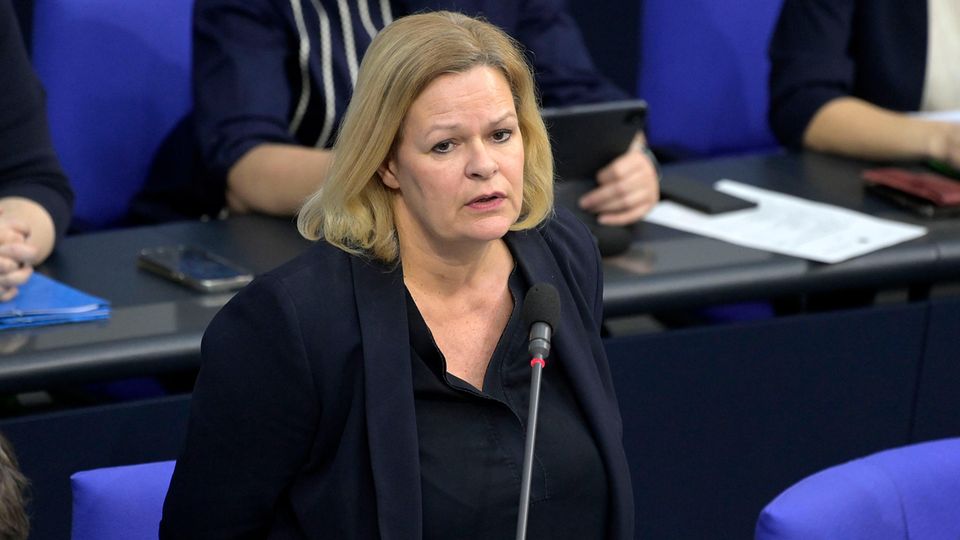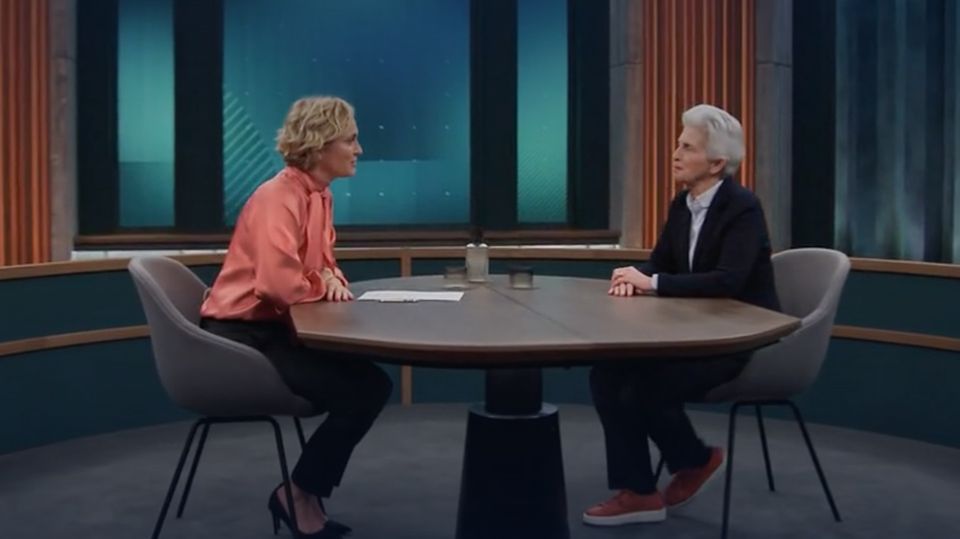A potpourri of violent threats, from xenophobic chants on Sylt to the threat of terrorism at the upcoming European Football Championships to anti-Semitic attacks in Germany: Nancy Faeser speaks to Caren Miosga about our security in Germany.
With most talk show topics, you ask yourself: Can’t we do it a little smaller? Instead of cramming everything you can think of into sixty minutes, it would be enlightening to address selected aspects. Caren Miosga had the chance to do this in her show, which initially focused on the Federal Minister of the Interior and Homeland, Nancy Faeser. But instead, as expected, the big stick was swung.
The question “How safe is Germany, Ms. Faeser?” covered everything from xenophobic chants on Sylt to the threat of terrorism at the upcoming European Football Championships to anti-Semitic attacks in Germany. The diversity of the topic certainly had the chance to spark various debates. Ultimately, however, everything remained on the surface, a single pointing out: Oh, we could, should, must do something about that.
Guest at “Caren Miosga” were:
- Nancy Faeser, Federal Minister of the Interior and Home Affairs (SPD)
- Güner Yasemin Balci, Commissioner for Integration in Berlin-Neukölln
- Ronen Steinke, lawyer, journalist and author
Our society has to endure a lot
Chanting right-wing slogans, as in the video from Sylt that has been circulating on social media for a few days, is “deeply inhumane and racist,” judged Nancy Faeser. That is why it is important to show boundaries here instead of constantly pushing them further. But “we are a strong society that has to put up with a lot.” That is why it must now be clarified what of what was said, shouted and discussed in the video and on site is really justiciable. Because not everything, as Faeser emphasized several times during the talk show, “not everything that we don’t like is forbidden.” Here it is always important to check.
In general, however, the Federal Minister of the Interior is in favour of faster proceedings that also end with clear consequences. Because the “perpetrators must know that they have done something wrong” and must feel the consequences. This would also help the reputation of the constitutional state, which some people no longer feel respected by. One reason why this happens too rarely, however, is the “period of austerity” in the justice system over the past few decades. “That was not good for the constitutional state,” said Faeser. Caren Miosga’s objection as to whether the blitz proceedings used in the case of the climate stickers could not also be applied to attacks on local politicians. There were expected phrases about how this could be used. “There must be no differences,” the state must react more quickly because this would promote trust in the rule of law. So far, so predictable. There were neither questions nor suggestions about how this should be implemented in terms of content.
Deterioration of morals
Nancy Faeser complained about a general “brutalization of morals” and that words are now followed by actions. This was different in her early days in local politics. There were arguments between the parties, for example, but it was also important that everyone could look each other in the eye afterwards. Nowadays, “public denunciation” is more common everywhere, whether it is among those involved in Sylt or among political counterparts.
Terror threat at the European Championships
According to Nancy Faeser, there is “a very high abstract risk” for the European Football Championship and no “absolute security”. But of course everything is being done to make the games safe. Miosga wanted to know from Faeser whether she knew more about the danger than she admits and played a clip from Thomas de Maizière in which he pointed out that he did not want to unsettle the population with his knowledge. She doesn’t think this sentence “very often”, said Faeser, and when asked, added with a laugh, “You are assuming that I know a lot more than I say”. It would be desirable for the Federal Minister of the Interior to know more about the security situation at the European Championship than the ARD journalist, but perhaps Faeser simply did not want to worry the audience too much. It is known that a terrorist organization attributed to IS is vaguely threatening the games, but no concrete plans are known.
“Muslim Interactive” is being tested
This does not apply to “Muslim Interaktiv”. The two guests Güner Yasemin Balci and Ronen Steinke turned to Nancy Faeser with the question of why this association, which is not only active on social networks but also, according to Balci, recruits members on the street, has not been banned long ago. According to Steinke, there is a “potential threat” emanating from “Muslim Interaktiv” and this should result in a ban on its activities. The “authorities are investigating and when we are ready, we will also ban it,” replied the Federal Minister of the Interior. It is important that it “holds up legally”. The Commissioner for Integration and the journalist were not satisfied with these indications. There are threats against those who support democracy and against “Muslim Interaktiv”. As soon as these have reached a legal framework, they could be prosecuted, said Faeser.
Clear stance against anti-Semitism
There are few reports of this, just like there are of anti-Semitic attacks. Ronen Steinke explained that there is not much trust in the police in the Jewish community. This is a “structural and legal problem,” said Steinke. Under the traffic light coalition, there has been progress in the area of measures against anti-Semitism in the police, and disciplinary measures have been made easier, but the effect of this is limited. What is needed is “a much clearer stance,” faster and stricter measures. Nancy Faeser referred to the improvements in the disciplinary process, but did not allow the criticism. One should not exaggerate immediately, but look at what is really forbidden.
Further topics:
- Lack of willingness to engage in dialogue at university Some students at the Humboldt University in Berlin recently drew attention to themselves with anti-Semitic statements. Nancy Faeser focused her statement on the fact that a piece of graffiti shown there is forbidden and punishable.
- Minority keeps the majority in check: Guner Yasemin Balci warned again that it was important to “take out of circulation” those people who repeatedly show hostility to democracy. Balci also said “I am worried about our free society”.
It is doubtful that much insight could be gained from this “Caren Miosga” broadcast. Not only were the positions too predictable, the choice of topics was also far too overloaded for talk show time. And so the conclusion is once again: good approach, not enough made of it. This is not the fault of the moderator, but of the idea of the talk show in general, to always ask politicians to use as many phrases as possible. Because of course it was already clear beforehand that Faeser could not comment on threats regarding the European Championship, that internal investigations into “Muslim Interaktiv” or criticism of anti-Semitic police officers were rarely commented on. From this point of view, it was an important sign that the Federal Minister of the Interior once again emphasized that the threat to our democracy does not only come from outside, but is also crumbling within and that we must work together with all our strength to counteract it.



